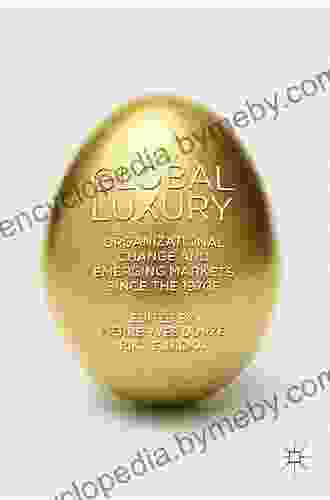Organizational Change and Emerging Markets: A Transformative Journey Since the 1970s

Since the 1970s, the world has witnessed a profound transformation in the way businesses operate and economies grow. The rise of emerging markets and the forces of globalization have revolutionized the business landscape, creating both challenges and opportunities for organizations and economies alike.
4.4 out of 5
| Language | : | English |
| File size | : | 2968 KB |
| Text-to-Speech | : | Enabled |
| Enhanced typesetting | : | Enabled |
| Word Wise | : | Enabled |
| Print length | : | 403 pages |
| Screen Reader | : | Supported |
This article provides a comprehensive overview of organizational change and emerging markets since the 1970s, exploring the key drivers, challenges, and opportunities that have shaped this transformative era in business and economics.
The Rise of Emerging Markets
The term "emerging markets" refers to countries that are experiencing rapid economic growth and are transitioning from developing to developed status. Since the 1970s, emerging markets have become increasingly important players in the global economy, contributing significantly to global growth and demand.
Some of the key factors that have driven the rise of emerging markets include:
- Political and economic reforms: Many emerging markets have implemented market-oriented policies, including privatization, deregulation, and trade liberalization, which have stimulated economic growth and foreign investment.
- Demographic changes: Emerging markets have large and growing populations, providing a vast market for goods and services.
- Technological advancements: Technology has played a crucial role in the development of emerging markets, enabling them to leapfrog traditional development paths and access global markets.
Globalization and Organizational Change
Globalization refers to the increasing interconnectedness of the world through trade, investment, and communication. Since the 1970s, globalization has accelerated rapidly, driven by advances in transportation and technology.
Globalization has had a profound impact on organizations, forcing them to adapt to the changing demands of the global marketplace. Some of the key challenges and opportunities that globalization has presented for organizations include:
- Increased competition: Globalization has intensified competition in many industries, as companies from around the world compete for market share.
- New market opportunities: Globalization has also opened up new market opportunities for organizations, allowing them to expand their reach and access new customers.
- Supply chain complexity: Globalization has made supply chains more complex, as companies source materials and products from around the world.
Organizational Change in Emerging Markets
Organizations operating in emerging markets face a unique set of challenges and opportunities. These challenges include:
- Political and economic instability: Emerging markets can be characterized by political and economic instability, which can create risks for businesses.
- Cultural differences: Organizations operating in emerging markets must navigate cultural differences, which can impact business practices and decision-making.
- Infrastructure challenges: Emerging markets often have inadequate infrastructure, which can hinder business operations.
Despite these challenges, emerging markets also offer significant opportunities for organizations. These opportunities include:
- Large and growing markets: Emerging markets have large and growing populations, providing a vast market for goods and services.
- Low-cost labor: Emerging markets often have lower labor costs than developed markets, which can reduce operating costs for businesses.
- Government incentives: Governments in emerging markets often provide incentives to attract foreign investment, such as tax breaks and infrastructure support.
Case Studies of Organizational Change in Emerging Markets
Several organizations have successfully navigated the challenges and opportunities of emerging markets. Here are a few case studies:
- Nestlé: Nestlé is a global food and beverage company that has been operating in emerging markets for decades. The company has adapted its products and marketing strategies to meet the needs of local consumers in emerging markets and
4.4 out of 5
| Language | : | English |
| File size | : | 2968 KB |
| Text-to-Speech | : | Enabled |
| Enhanced typesetting | : | Enabled |
| Word Wise | : | Enabled |
| Print length | : | 403 pages |
| Screen Reader | : | Supported |
Do you want to contribute by writing guest posts on this blog?
Please contact us and send us a resume of previous articles that you have written.
 Book
Book Novel
Novel Page
Page Chapter
Chapter Text
Text Story
Story Genre
Genre Reader
Reader Library
Library Paperback
Paperback E-book
E-book Magazine
Magazine Newspaper
Newspaper Paragraph
Paragraph Sentence
Sentence Bookmark
Bookmark Shelf
Shelf Glossary
Glossary Bibliography
Bibliography Foreword
Foreword Preface
Preface Synopsis
Synopsis Annotation
Annotation Footnote
Footnote Manuscript
Manuscript Scroll
Scroll Codex
Codex Tome
Tome Bestseller
Bestseller Classics
Classics Library card
Library card Narrative
Narrative Biography
Biography Autobiography
Autobiography Memoir
Memoir Reference
Reference Encyclopedia
Encyclopedia Aaron Lansky
Aaron Lansky Bill Karwin
Bill Karwin A Sorority Of Mothers
A Sorority Of Mothers Rachel Hoffman
Rachel Hoffman Aaron Fine
Aaron Fine A S Byatt
A S Byatt Aaron Sautter
Aaron Sautter A K Blakely
A K Blakely Abdul Ghaffar Khan
Abdul Ghaffar Khan Wonder House Books
Wonder House Books Adam Fortunate Eagle
Adam Fortunate Eagle Abby Franquemont
Abby Franquemont Lindsay Mattick
Lindsay Mattick Abbi Waxman
Abbi Waxman Adam J Wright
Adam J Wright Aaron Shepard
Aaron Shepard Greg Presto
Greg Presto Aaron James Draplin
Aaron James Draplin Aaron Barlow
Aaron Barlow Joseph Dileonardo
Joseph Dileonardo
Light bulbAdvertise smarter! Our strategic ad space ensures maximum exposure. Reserve your spot today!

 Jorge Luis BorgesMultispecies Approach Forerunners: Unlocking the Potential of Cross-Species...
Jorge Luis BorgesMultispecies Approach Forerunners: Unlocking the Potential of Cross-Species... Xavier BellFollow ·19.4k
Xavier BellFollow ·19.4k Dallas TurnerFollow ·12.5k
Dallas TurnerFollow ·12.5k Clark BellFollow ·14.3k
Clark BellFollow ·14.3k Brody PowellFollow ·9.3k
Brody PowellFollow ·9.3k Victor TurnerFollow ·15.9k
Victor TurnerFollow ·15.9k Francis TurnerFollow ·10.9k
Francis TurnerFollow ·10.9k Stan WardFollow ·5.2k
Stan WardFollow ·5.2k Patrick RothfussFollow ·15.9k
Patrick RothfussFollow ·15.9k

 Timothy Ward
Timothy WardFearless Painting for True Beginners: Learn to Create...
Unlock the Joy of...

 Fernando Pessoa
Fernando PessoaProven 12-Step Program for Financial Peace of Mind:...
Are you struggling with...

 Chinua Achebe
Chinua AchebeLayers Colors Desire: Layers Colors Thoughts Mystery
A Literary Labyrinth...

 Fernando Bell
Fernando BellUnearth Hidden Treasures: Journey Through "Secondhand...
Prepare to embark on an extraordinary...

 Caleb Carter
Caleb CarterSymbolic Messages Garage Sale Mysteries: Unveiling the...
Welcome to the extraordinary world of the...

 Nikolai Gogol
Nikolai GogolTravels in the Billion Dollar Trash Trade: Uncovering the...
Ỡ In his...
4.4 out of 5
| Language | : | English |
| File size | : | 2968 KB |
| Text-to-Speech | : | Enabled |
| Enhanced typesetting | : | Enabled |
| Word Wise | : | Enabled |
| Print length | : | 403 pages |
| Screen Reader | : | Supported |










